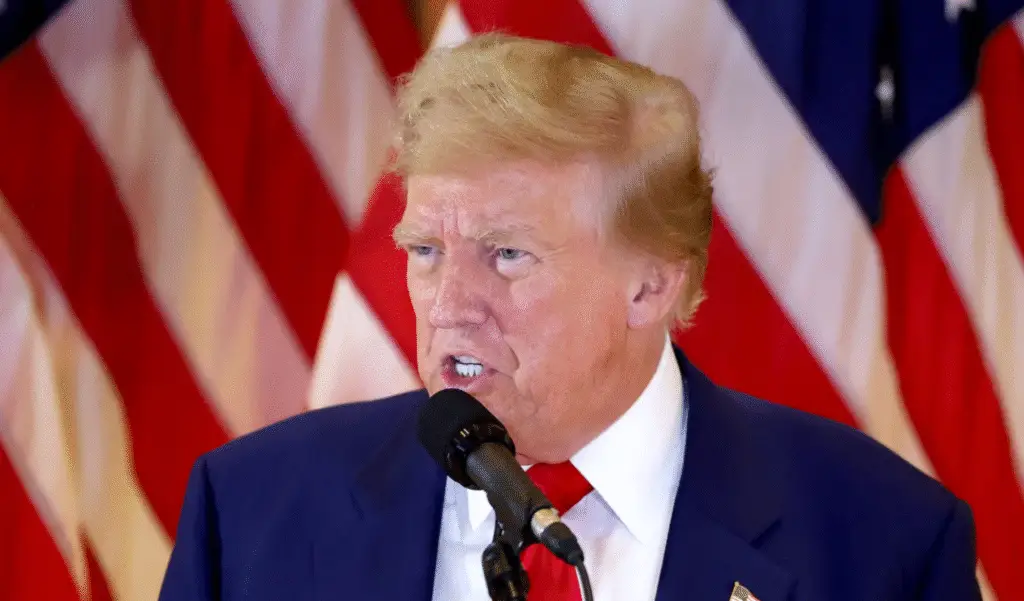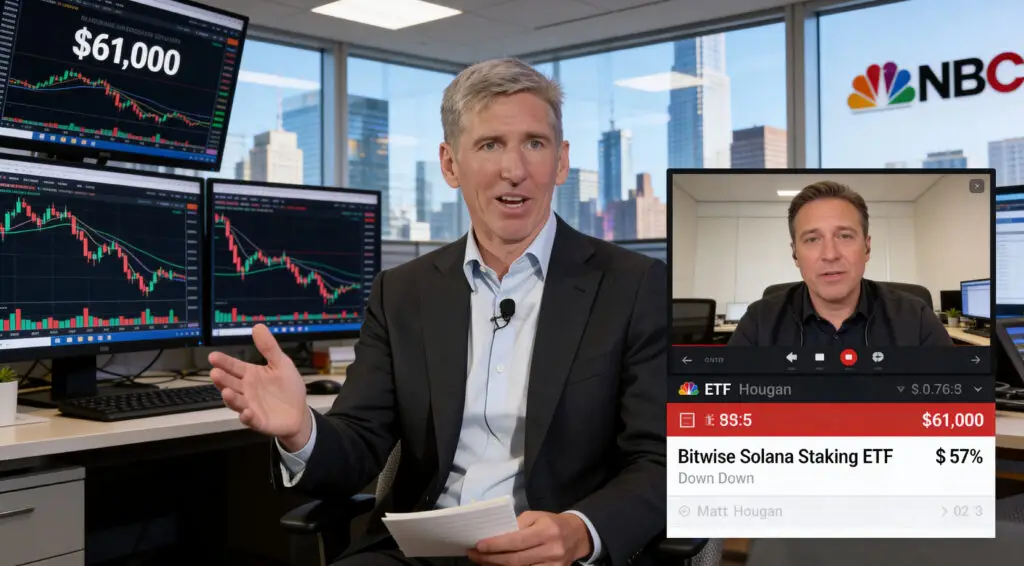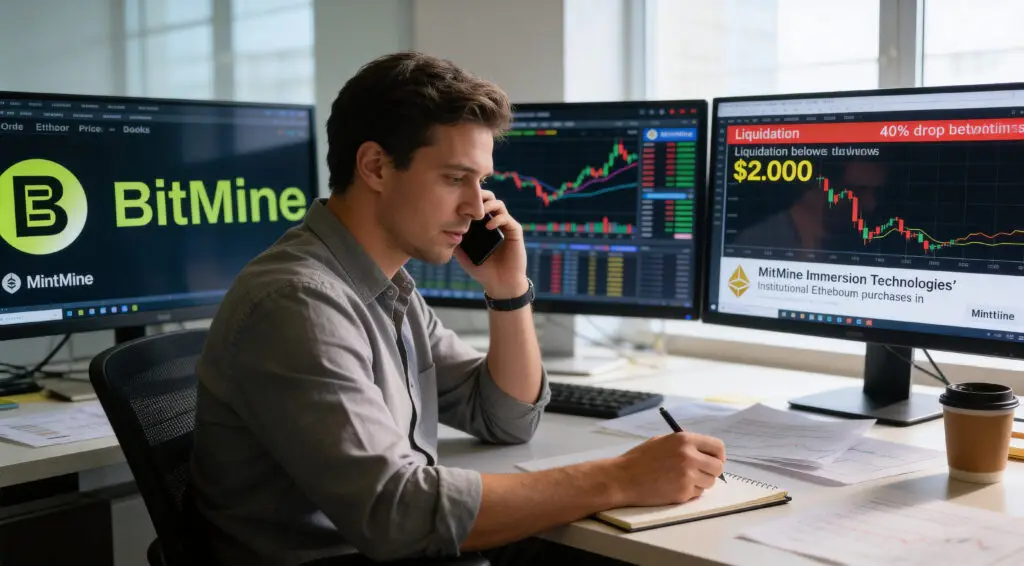Trump Administration Unveils Massive H-1B Visa Fee
President Trump announced a $100,000 fee for new H-1B visa applications, which has shocked companies relying on skilled immigrants. The fee applies only to first-time visa applicants in the next lottery cycle and does not apply to existing visa holders or renewals.
The administration’s aggressive move to limit legal immigration and change work visa rules is seen as a threat to the tech and finance industries, which rely heavily on skilled workers from other countries. Experts warn that the fee could make the US less competitive in global markets.

Source: Bloomberg
Big Tech Companies Send Out Urgent Travel Warnings
Amazon, Microsoft, Meta, Apple, and Google were some of the companies that were hit the hardest. They had thousands of H-1B visas. Amazon’s immigration team told people with H-1B and H-4 visas to stay in the U.S. and not travel abroad. Microsoft said the same thing, warning that travel risks could put employees’ immigration status and long-term residency at risk.
Goldman Sachs and JPMorgan Chase also told H-1B workers to stop traveling outside the U.S. Internal memos showed that there were worries that new rules could make it harder to renew visas or re-enter the country. The quick responses show how seriously businesses take the possible fallout from Trump’s harsh policy change.
Tech Industry Reliance on Skilled Immigrants
With more than 14,000 visa holders as of June 2025, Amazon is the biggest H-1B employer. Microsoft, Meta, Apple, and Google are next in line, each hiring thousands of people through the program. These workers are very important for U.S. innovation leadership in software development, artificial intelligence, and cloud infrastructure.
The fee could make companies less likely to hire foreign workers, which would lead to a lack of skilled workers. Experts on immigration say that American companies may have trouble finding workers in the U.S. The long-term risk is that it will make America less dominant in science and technology around the world, giving competitors an edge.
Recommended Article: Manila Tech Summit 2025 Highlights: Digital Transformation and Financial Inclusion
Trump Defends Policy as Protecting U.S. Jobs
Taylor Rogers, a spokesperson for the White House, defended the new policy by pointing out that Trump promised during his campaign to put American workers first. She said that the fee stops companies from abusing the system and raises the wages of workers in the US. The government says this will stop businesses from sending in too many applications.
Supporters of Trump say that the measure makes sure that only businesses that really need it pay the high price. Critics, on the other hand, say it is economic isolationism that could hurt U.S. competitiveness in the long run. The announcement makes the debate over how to protect jobs at home while still allowing immigration even more heated.
Foreign Governments React to Visa Shockwave
India’s Ministry of External Affairs is investigating visa restrictions for Indian workers, citing potential harm to families and businesses and hindering collaboration on new ideas. They have urged the U.S. government to address humanitarian issues arising from family separation and project delays.
South Korea’s foreign ministry is also concerned about the impact on businesses and skilled workers. Governments worldwide are assessing the risks for H-1B visa holders, posing potential diplomatic tensions as countries fight against protectionist policies.
Financial Sector Joins Tech in Raising Alarms
JPMorgan Chase and Goldman Sachs have issued immigration advice to H-1B visa holders, warning them not to travel outside the US without legal advice. This comes after Fragomen’s immigration advice, which also prompted Goldman Sachs to warn employees about the higher travel risks.
Financial companies relying on skilled immigrants are upset by the sudden changes, which make it difficult to plan for their workforces. The $100,000 fee could make it harder for banks to hire international workers, potentially causing concern about the US losing its global competitive edge.
Humanitarian and Family Consequences Raised
India specifically warned about the humanitarian effects of sudden restrictions on workers and their families. Visa holders are worried that families could be separated if international travel or reentry is delayed. Human rights activists say that policies should find a balance between controlling immigration and caring for workers around the world.
Critics say that the sudden changes ignore what is really going on with people and make families more vulnerable during geopolitical changes. Diplomatic appeals may make U.S. officials less strict about enforcing the law or add rules that make things easier. Until then, workers and their families are getting ready for the unknown because of strict visa rules.
$100K H-1B Fee Could Push Tech Talent and Innovation Overseas
The high H-1B fee in the US could hinder the flow of skilled workers, potentially leading to companies moving operations to other countries, potentially benefiting Europe and Asia. This could also impact the US’s innovation pipeline, potentially impacting its lead in cloud computing and artificial intelligence.
Policy analysts suggest that long-term immigration reforms should balance the country’s needs with the global economy’s needs. The fee could also impact the distribution of technology and finance workers globally.















